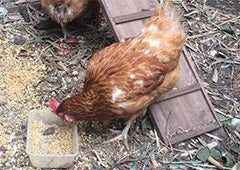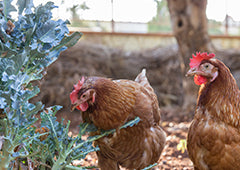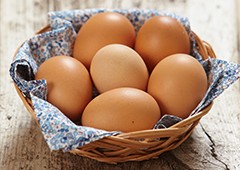Backyard chickens all around the world are clucking about their egg-straordinarily nutrient rich eggs! Backyard chicken keepers know that when they allow their chickens to free range, their chooks’ eggs are indeed healthier. Why? Free ranged chickens are “free” to egg-splore and forage, consuming plants, insects, and seeds and grains which provide them with a much higher quality diet than that of just feed. They are consuming nutrition as nature intended-they’re pecking simple, organic, additive- free, and nutritionally rich food which promotes healthy growth and development. So, what’s all that clucking about, anyway? Well, let’s take a look at the factors that greatly influence the quality of chicken eggs.

Environment is Everything!
The environment in which chickens are raised is essential to their general health and wellbeing. Environment is really everything. An ideal environment is one that offers ample space to move freely about inside their house, as well as, to leisurely roam the good earth for the dual-purpose of egg-sercising and foraging. The benefits of daily egg-ercise and access to the “all-chickens-can-peck” buffet of nature, are egg-ceptional! Chickens that get the majority of their nutrition from nature are healthier all around-they are able to consume more omega-3 richness from legumes, vitamin E from whole grains and fresh greens, vitamin A from corn, vitamin B2 or Riboflavin from legumes, leafy greens, and tomatoes, and vitamin D, a vital ingredient in the absorption of calcium and phosphorous needed for quality egg production, from basking in the warmth of the glorious sunshine, and protein, fat, vitamins and minerals from slurping up tasty worms and bugs!
Proper Nutrition is Vital!
Most backyard chicken keepers put a lot of time and effort into feeding their flock. We offer our chooks the “Oh So Good for Them” opportunity to free range the day away, for shorter periods daily or as often as possible. When we allow our chooks to free range, we are blessing them with the gift of great grub, and the chance to eat plenty of green plants, luscious legumes, great grains, spectacular seeds, and incredibly delicious insects. We choose commercially produced feed appropriate to our flocks’ stages of development or we mix up our own unique batch whether it be fermented or unfermented feed. And, we supplement, supplement, supplement by offering our fine feathered friends kitchen scraps chock full of vitamins and minerals, probiotics, fresh from our garden herbs and vegetables, and boost their immune system with ACV (Apple Cider Vinegar) added to their water.

The Egg-straordinarly Incredible Edible Egg!
So, how do backyard farm fresh eggs compare to factory raised chicken eggs? Let’s take a peek inside the incredible edible backyard chicken egg and see what we discover.
Chicken eggs are a staple food found in virtually every refrigerator or sitting pretty atop a kitchen countertop throughout the world. However, not all chicken eggs are created equal. Eggs from chickens raised in small backyard flocks or on family farms are by far stronger, healthier and so much better for us than those produced by their overcrowded factory cage-raised counterparts. Backyard chicken eggs have more of the good stuff such as Omega-3s and bright colorful yolks and much less of the bad stuff such as the infamous cholesterol and saturated fat!
Age aside, a hen’s egg is a direct reflection of her environment and nutritional intake. Research shows that backyard chicken eggs contain a higher quality of nutrition in comparison to eggs laid by commercial factory hens. In this quest to compare nutritional quality, several studies have been conducted around the world. In 1988, research for the book, The Omega Diet, unveiled supportive evidence in eggs laid by backyard hens in Greece. A British study in 1974 concurred. More recently, in 2007, a study conducted by Mother Earth News revealed that free- ranged hens from fourteen different small family farms across the United States laid eggs that were far superior in nutritional quality than hens raised in cramped, stuffy, confined conditions with no access to the great outdoor buffet! Check out these startling statistics:
-
Twice as much Omega-3 Fatty Acids
-
Three times more Vitamin E
-
Seven times more Beta-carotene from Vitamin A
-
Fifty percent more Folic Acid
-
One quarter LESS Saturated Fat
-
One third LESS Cholesterol
-
Up to six times more Vitamin D
-
Significantly more of the B Vitamins
-
Significantly more of the Antioxidants, Lutein and Zeaxanthin
Backyard chickens do truly get to live their lives to the fullest! This awesome lifestyle manifests itself in healthy looking, clucky, flap-happy chooks who lay LOTS of large strong- shelled nutritiously healthier EGGS! The wonderful world of backyard chickens = an essential environment for happy healthy chooks and delicious egg-straordinarily nutrient rich eggs which in turn = happy healthy backyard chicken keepers! Now that’s definitely a win-win situation!

The benefits of having chickens are limitless! From friendly companionship to fresh produce, being a chicken keeper is both rewarding and eggciting! Nothing beats having home-laid eggs in the house for delicious, healthy meals and baking treats. However, in order to get a frequent, fresh supply of eggs, keepers need to look after the chickens that lay them. There can be multiple issues that are stopping your ladies from laying which is stressful for them and for you!
Don’t worry though – the eggsperts at Chickenpedia have cracked it! They have created the Eggs in Your Basket course to help you, help your ladies lay successfully. Discover crucial information to keep your chickens happy, healthy, and frequent layers. All your egg questions will be answered in this extensive course.
From double yolkers, to soft shells, no eggs, to odd eggs, Chickenpedia cover it all! Check out their great beginner-friendly courses today.

















